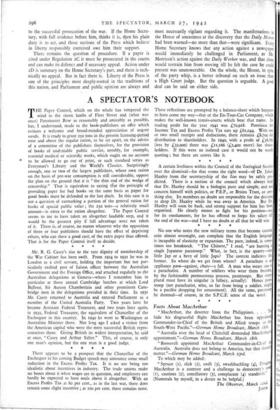There appears to be a prospect that the Chancellor of
the Exchequer in his coming Budget speech may announce some small reduction in the Excess Profits Tax. It is no use being too idealistic about incentives in industry. The trade unions make no bones about it when wages are in question, and employers can hardly be expected to have souls above it altogether. With an Excess Profits Tax at 8o per cent., as in the last war, there does remain some slight incentive ; at too per cent. there remains none.
These reflections are prompted by a balance-sheet which happens to have .come my way—that of the En-Tout-Cas Company, which makes the well-known tennis-courts which bear that name. Its trading profit for the year 1941 was £70,918. Provision fo: Income Tax and Excess Profits Tax eats up £61,044. With one or two small receipts and deductions, there remains £8,7oo for distribution to shareholders. In 1940, with a profit of £38,785 (less by £32,000) there was £11,166 (L2,400 more)- for share- holders. If this were an isolated case it would not be worth quoting ; but there are scores like it.
* * * *


























 Previous page
Previous page